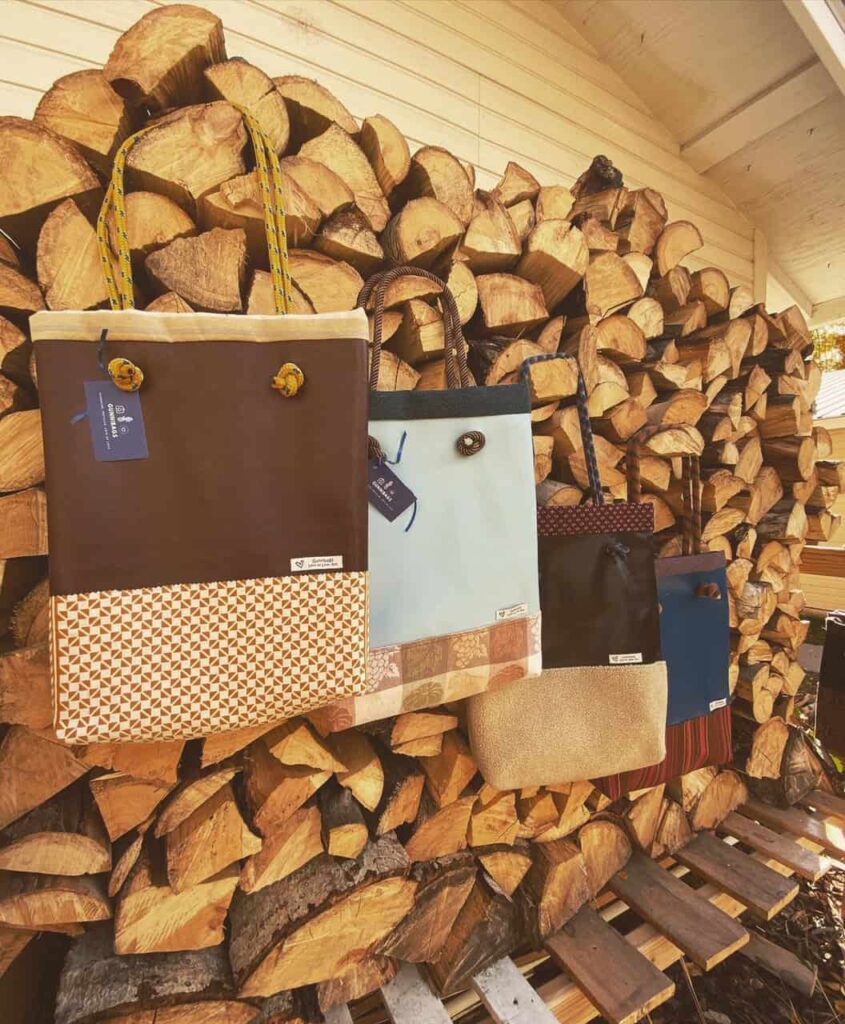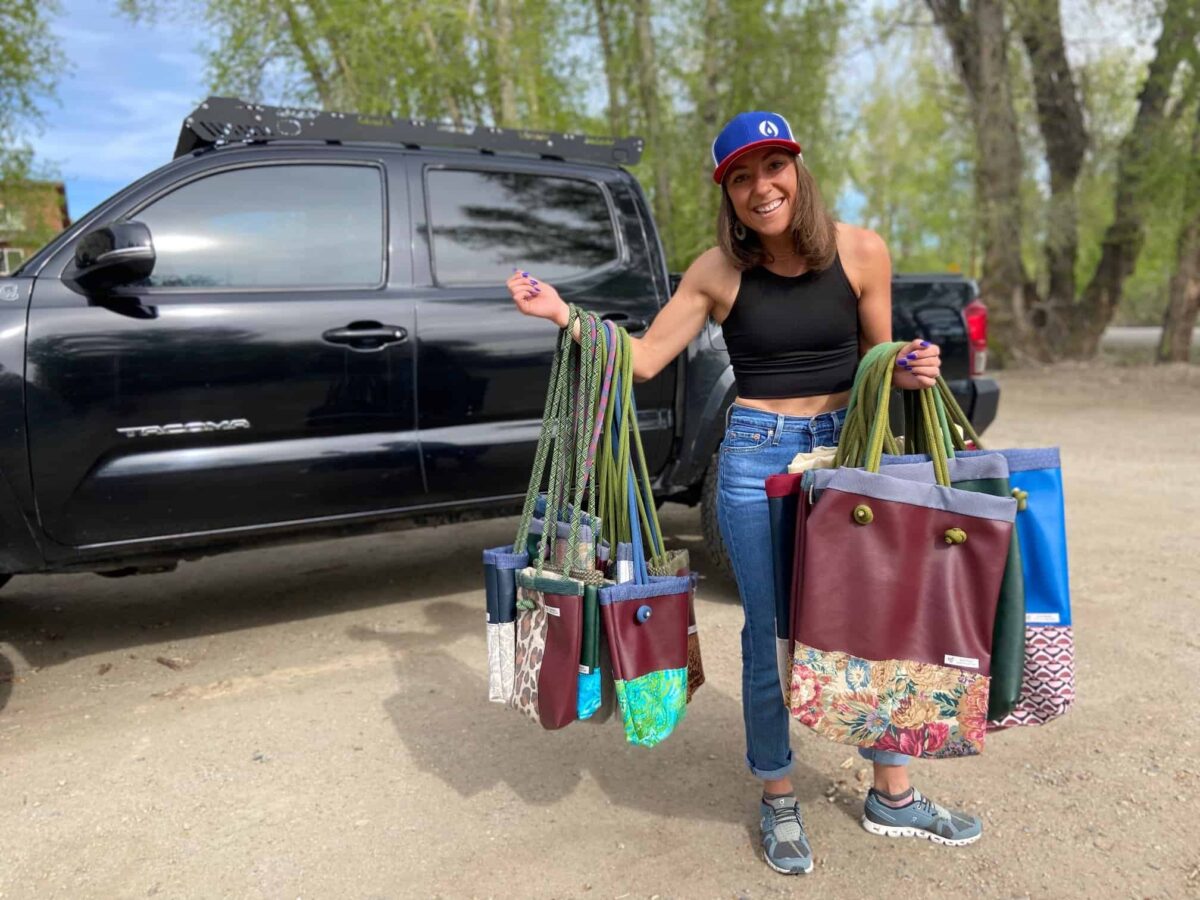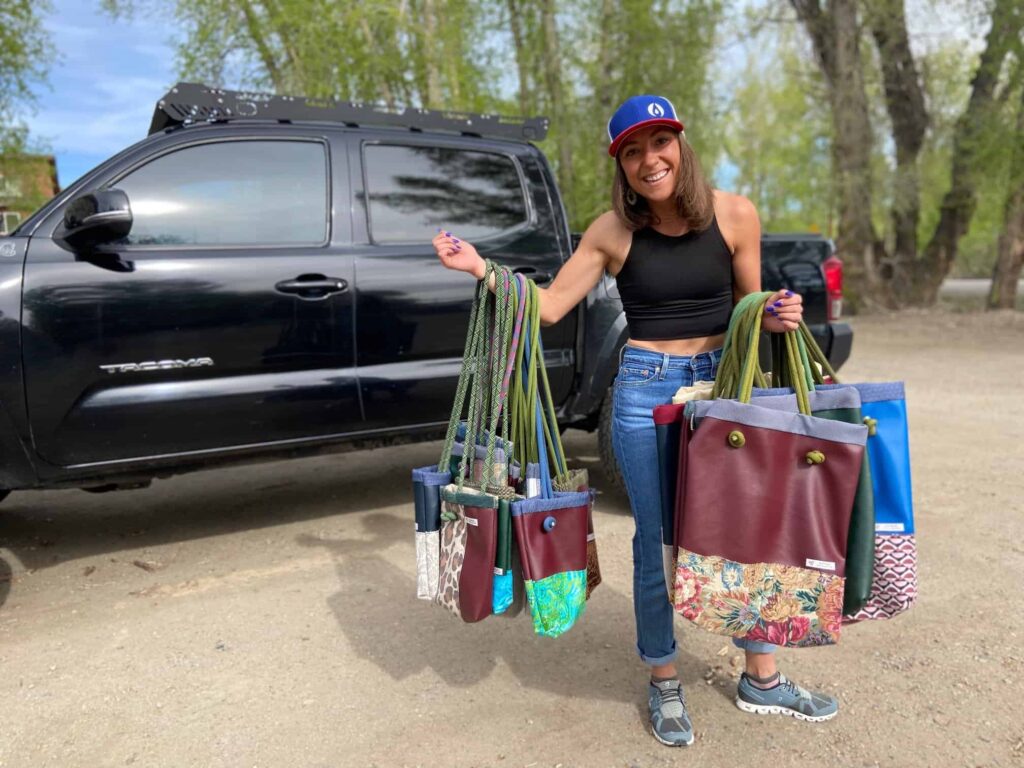
“I started making GunniBags in 2018. I just made them for Christmas gifts one year in Gunnison,” says Veronica Wilde, the founder of GunniBags. “I was a very poor college kid, and I was making all my Christmas gifts from hand that year.”
Soon, GunniBags became a fledgling enterprise when Wilde trekked over to Six Points to source some additional free fabric. “I made some smaller pouches, and realized really quickly that I hated sewing zippers—that’s how GunniBags were made—my massive distaste for sewing zippers,” Wilde recalls with a chuckle.
She produced roughly a dozen bags as gifts in that period, but soon word of mouth had people from her hometown of Seward, Alaska inquiring about purchasing bags. That positive buzz quickly led to a deal to produce bags for a local boutique. “GunniBags were huge in Alaska before they were even known very well here,” adds Wilde, who still sells the bags via two retail locales in her native state.
Wilde says that her childhood experiences in Seward sparked the eventual creation of GunniBags. “I have a big environmentalist bone in me surrounding plastics because I grew up on the ocean, and it’s deeply ingrained in you when you grow up on the ocean about our [societal] overuse of plastics,” she explains.
Wilde also has a personal mentor in Alaska—a restaurant owner, baker, and artist who instilled a sense of entrepreneurship in her, and spurred her to launch GunniBags.
“She got one of the GunniBags that first year as a gift…she’s a phenomenal mentor and she’s the one who really kicked me in the butt and said ‘you should take off with this—there’s a bunch of climbers there, it’s environmentally friendly, and there’s an [overall] need for textile reuse,” recalls Wilde.
Sure enough, the bags took off quickly within the Gunnison Valley as Wilde became more established within the community. Wilde remembers that in the early days, the manufacturing process was very much a work in progress.
“GunniBags was running on a [domestic] Singer [sewing machine], I had no idea what a grommet press was, so I was using a cement block in my living room and hammering each grommet…I didn’t know that a rope burner existed, so I was literally cutting all my ropes with scissors…and using a kitchen knife to cut holes for my grommets,” she remembers.
Back then, Wilde was selling the bags for $18 apiece. She soon learned from some trial and error— and some helpful prodding from a business professor, that the bags could sell for much more with little reduction in demand. Today, the standard bags retail for $65.
Adding to the bag’s local marketability is a simple fact that stems from the bag’s assembly from diverse, reused materials—no two bags will ever be the same, so there’s always a sense of exclusivity and discovery among GunniBag customers.
Throughout her run with GunniBags, Wilde has maintained a close connection to Western. Currently, she holds down a full-time gig handling external communications for the Energy Management program, a role that includes fundraising, recruiting, and loads of associated travel.
Wilde graduated from Western with a Business degree in 2016, and went on to earn an Outdoor Industry MBA in 2021— the program’s second cohort. She now teaches a course of her own within the university’s business school: Professional Development and Personal Growth.
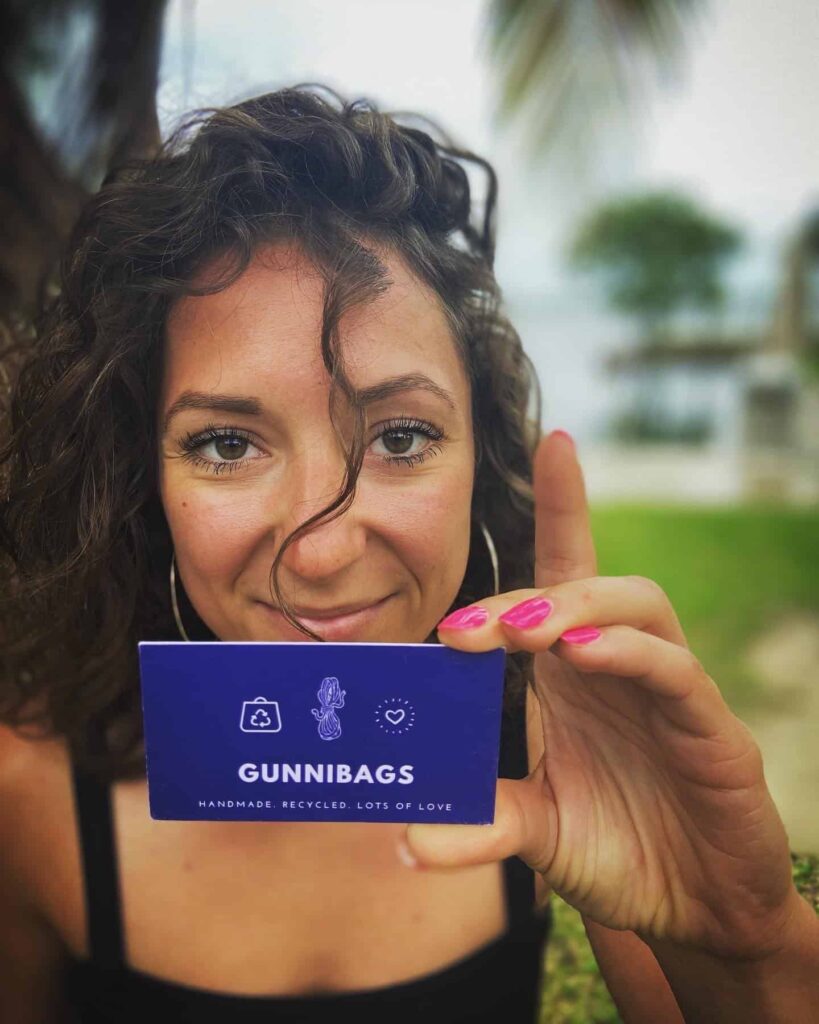
Crafting the GunniBags
Nowadays, Wilde—who remains a one woman show on GunniBags, has the bag’s production process down to a tee. “I [do] have a handful of friends that come through and I’ll say ‘come over and I’ll cook all of you guys dinner if you want to sit there and grommet and watch movies with me for an hour and a half…but formally it’s still just me running GunniBags.”
As part of Wilde’s job, she makes regular visits to the Front Range, where she scoops up recycled material from two Goodwills—largely to fashion the bag’s exterior.
But a large share of GunniBags’ material actually stems from a local connection, the wife of a recently deceased upholsterer who had a massive stockpile of excess fabric—and reached out after GunniBags picked up some local media attention.
Wilde came over to the woman’s house to find a barn full of upholstery fabric, which she transported back to her condo in Subaru loads. That material has been steadily supplying the interior of the GunniBags for more than a year.
Rounding out the bag’s material sources are the ropes—predominantly from local climbers, along with a bulk-ordered recycled plastic for the bag’s base that is itself more than 80 percent recycled.
Nowadays, Wilde will produce batches of 50 to 75 bags at a time, carefully matching interior to exterior fabrics. “Every different batch of bags is going to be completely different—I’m using all different types of fabric, all different thicknesses of fabric, [and] all different patterns. I try to put a decent bit of time in going through and pairing them up how I think people will like them.”
For the interior sewing, Wilde utilizes an inherited sewing machine passed down from her great grandmother. “It’s been in my family for like four generations now and it’s still running strong,” she adds.
This past year, Wilde has begun using more upholstery fabric to make thicker, more durable bags, she upgraded to an industrial sewing machine—originally intended to sew sailboat sails—for the bag’s exterior.
She notes that while the bags may not be advertised waterproof, they have stood up valiantly to her personal product tests from hoses and washing machines alike.
Throughout her supply and production chain, Wilde has made it a point to stay small, and work one-on-one with other local and regional businesses. “It’s a good community feel across GunniBags,” she adds. “GunniBags should have this nostalgic, local sentiment to them.”
Around the holidays, Wilde will still post GunniBags on the website for Christmas shopping, but she maintains an exclusive deal with Treads n’ Threads to sell the bags in the Gunnison Valley. She sees that pairing as a natural fit with the retailer’s hyper localized brand and support for the nonprofit Gunnison Trails.
“I just love the connectivity that we have—they’re very easygoing and understanding about when I was finishing up my master’s. I love working with them, and I told them that if they were willing to take me on, I would not sell in the Gunnison Valley below their price point,” adds Wilde.
The partnership with Treads n’ Threads ended up spurring the creation of a smaller bag, the Baba bag, which is more maneuverable and can be worn across the body. “It sells at a higher rate than my other bags now,” notes Wilde of the company’s smaller iteration, which retail for $45.
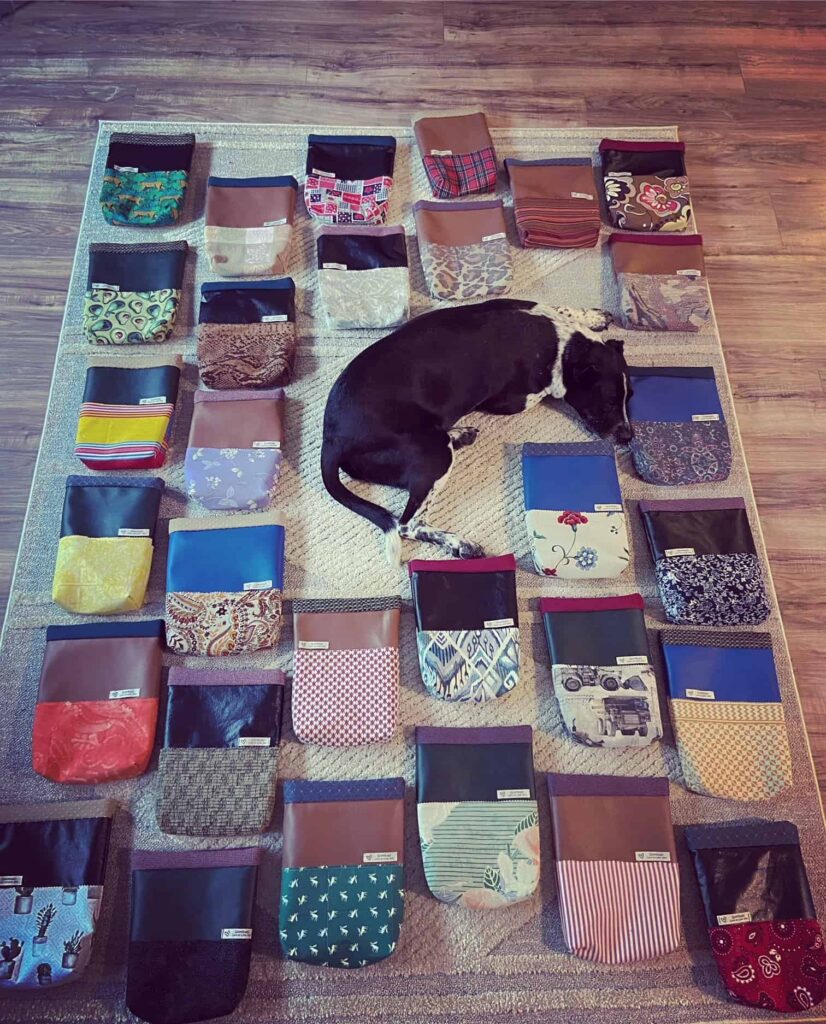
Facing pressure to grow
Wilde used some of her OIMBA coursework to fully explore the prospect of scaling GunniBags, but the demands of work, graduate school, and her burgeoning side hustle were taking a collective toll.
“I remember sitting down with the Director of the OIMBA and going ‘this is the most successful side business I’ve ever had and I’m about to just drop it and walk away because I’m so stressed out.”
For about 18 months, Wilde was conducting monthly bag drops on the business’ website, which added additional labor in the form of packaging and shipping bags individually. Now, she mostly makes regular bag drops to Treads n’ Threads—quenching the local demand in a manner that’s more sustainable for her over the long haul.
Ultimately, she decided to continue with the venture as a side business, but not to scale up and away from the aspects that make the business special: using recycled materials to produce and sell bags locally at a small scale, with a friendly community feel.
A while back, she received an offer to help grow the business from a prospective investor on the Front Range. Wilde gave consideration to the offer, but knew that accepting it would have meant shifting some production outside of the country and becoming much more involved in operations. Those tradeoffs were ultimately not worth the cost.
“It’s really the community support that’s made me keep doing it, because people love them,” says Wilde. “It does come down to the feel good part of it. You wouldn’t get that same feeling if GunniBags went into mass production.”
To date, GunniBags has sold more than 5,000 bags. “I think a lot of people think that GunniBags is my full-time gig,” adds Wilde, who is quick to note the prevalence of side hustles across the Gunnison community in an age of escalating housing and other living costs.
Early on, Wilde can remember sitting down with Professor Taryn Mead of the Outdoor Industry MBA program on the ICELab porch and seeing a person walk by with a GunniBag in tow. ‘She goes ‘look, it’s a GunniBag!’ It was one of the first times I’d seen a GunniBag in the wild. And that’s what we call it now—now all the MBA professors will text me and be like ‘we just saw a GunniBag in the wild!’” exclaims Wilde with a chuckle.
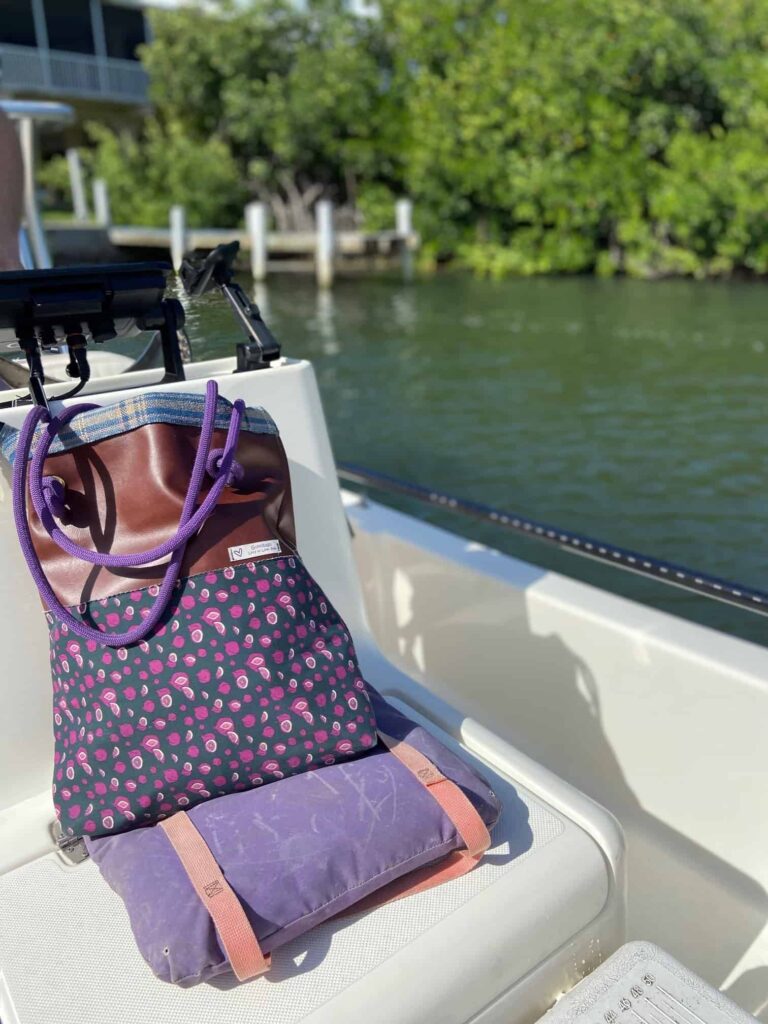
Using GunniBags for good
“People feel good buying a GunniBag,” says Wilde. A key part of that warm and fuzzy feeling is the fact that the bags are made locally by a community member of Gunnison, with more than 75 percent recycled material—diverting more than 2,000 cumulative pounds of textile waste away from the local landfill.
But another key aspect of that feel-good story is the 10 percent in proceeds that go to Gunnison Underdog, a local dog fostering organization. As a lifelong animal lover, Wilde quickly became involved with the Gunnison Valley Animal Welfare League (GVAWL) when she came to the valley. At that point it was Deb Callihan, who would later branch off to create Gunnison Underdog Rescue (GUR), running the show at GVAWL.
“I had this illogical thought that if I walked dogs in the morning it would end up preventing me from getting a dog…that backfired tremendously, I ended up getting a dog like four months later from GVAWL,” says Wilde, who kept in touch with Callihan through the years.
Then when Callihan launched GUR, Wilde began helping Deb place dogs within the community. As Wilde’s foster dog Leah began getting older, she began fostering dogs to help keep her own dog, Leah, company.
“I didn’t realize the massive amounts of expenses some of these foster families are incurring until I had a full litter of puppies with parvo…and some of these people are taking on litters every two or three months just to get them out of horrendous situations,” she adds.
Wilde began to more deeply consider the issue of financial support for volunteers who are fostering dogs. So when GunniBags started selling online, she began donating 10 percent of her proceeds to the foster care program to offset their expenses—15 percent over the holiday period. That financial partnership continued when she inked her distribution deal with Treads n’ Threads.
“All it takes is [one] chip out of my entire basket of chips, to contribute to something else in my community,” says Wilde. “All those businesses that have stuck around a long time, it’s because they’re the ones taking a chip out of their basket and putting it in another one.”
Another area where Wilde has been able to utilize her voice within the community was when she advocated on behalf of SheFly, an innovative outdoor apparel business that was founded by three female college students in Vermont, but moved to Gunnison with the assistance of an economic development grant intended to entice business relocation and local economic growth.
SheFly’s prospective move came under some fire from some local business owners who appeared to fully misunderstand the nature of the funds. Wilde recalls watching some in the community oppose SheFly’s relocation.
“I just felt this passion, because the only reason I’m here in this position with GunniBags is because I was welcomed with open arms,” says Wilde.
“Here we are, there’s another young female entrepreneur trying to do what I did at a significantly larger scale at a time when we need economic development in our community—and I watched her face a lot of frustrations from long-time business owners”
Wilde went to local government meetings as the founder of GunniBags to support SheFly and their intended relocation, which went through as planned in January 2022.
“We have to be open to new growth and economic development, and I’m finally in a position to be able to talk about how that happened to me here, and how that adds value to our community,” she says.
